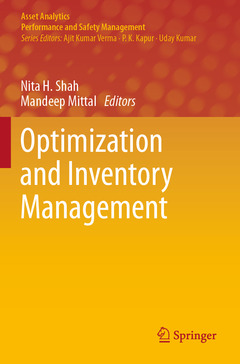Optimization and Inventory Management, 1st ed. 2020 Asset Analytics Series

This book discusses inventory models for determining optimal ordering policies using various optimization techniques, genetic algorithms, and data mining concepts. It also provides sensitivity analyses for the models? robustness. It presents a collection of mathematical models that deal with real industry scenarios. All mathematical model solutions are provided with the help of various optimization techniques to determine optimal ordering policy.
The book offers a range of perspectives on the implementation of optimization techniques, inflation, trade credit financing, fuzzy systems, human error, learning in production, inspection, green supply chains, closed supply chains, reworks, game theory approaches, genetic algorithms, and data mining, as well as research on big data applications for inventory management and control. Starting from deterministic inventory models, the book moves towards advanced inventory models.
The content is divided into eight major sections: inventory control and management ? inventory models with trade credit financing for imperfect quality items; environmental impact on ordering policies; impact of learning on the supply chain models; EOQ models considering warehousing; optimal ordering policies with data mining and PSO techniques; supply chain models in fuzzy environments; optimal production models for multi-items and multi-retailers; and a marketing model to understand buying behaviour. Given its scope, the book offers a valuable resource for practitioners, instructors, students and researchers alike. It also offers essential insights to help retailers/managers improve business functions and make more accurate and realistic decisions.
Date de parution : 09-2020
Ouvrage de 470 p.
15.5x23.5 cm
Date de parution : 09-2019
Ouvrage de 470 p.
15.5x23.5 cm
Disponible chez l'éditeur (délai d'approvisionnement : 15 jours).
Prix indicatif 137,14 €
Ajouter au panier